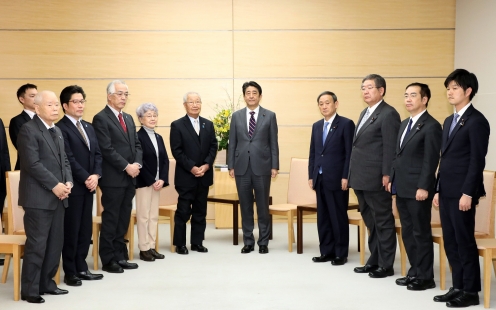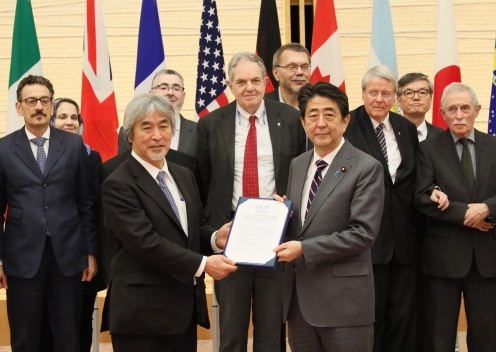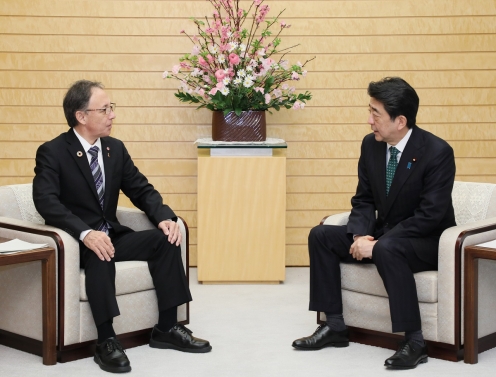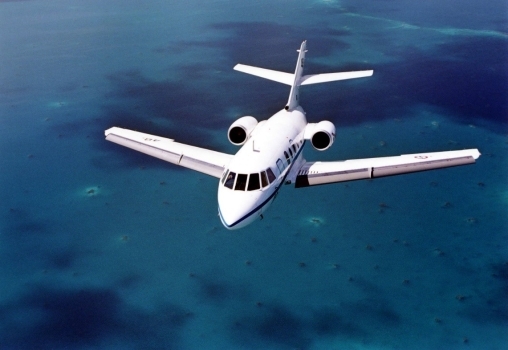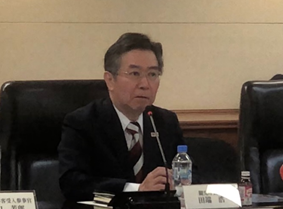Meeting with Families of Abductees and Others
Cabinet Secretariat, Wednesday, March 6, 2019
[Provisional Translation]
On March 6, 2019, Prime Minister Shinzo Abe held a meeting with families of abductees and others at the Prime Minister’s Office.
The Prime Minister said in his address,
“Thank you very much for taking time to visit the Prime Minister’s Office today amidst your busy schedules.
With regard to the outcome of the second U.S.-North Korea Summit Meeting held in Hanoi recently, I held a summit telephone talk with President Trump immediately after and heard the current status. Taking this opportunity, I would now like to share the report on this matter with you.
I told President Trump that, on the outcome of the summit meeting, Japan supports his decision not to make concessions to North Korea easily and at the same time, to continue constructive discussions, which were made with his strong determination to achieve the denuclearization of the Korean Peninsula.
At the same time, when I spoke to President Trump on the telephone before the summit meeting, I once again explained that Japan places great emphasis on the resolution of the abductions issue, and asked him to convey to Chairman Kim Jong-Un my outlook regarding the resolution of this issue. According to President Trump, he raised the abductions issue and conveyed my position on this matter to Chairman Kim Jong-Un at the one-on-one meeting. Furthermore, he continued to raise this issue at the dinner following that meeting which had involved only a small number of people, and the two leaders held a serious discussion on that matter.
Moving forward, as the United States maintains its policy to engage in consultations with North Korea, we would like to work on the abductions issue based on our basic policy of not missing out any possible opportunities. To that end, in order to resolve this issue, I believe that I, myself, have to meet face-to-face with Chairman Kim Jong-Un next. I will speak to you again on the details after this.”
Joint Statement by Science20
Cabinet Secretariat, Wednesday, March 6, 2019
[Provisional Translation]
On March 6, 2019, Prime Minister Shinzo Abe received the Joint Statement by Science20 (S20) at the Prime Minister’s Office.
The Prime Minister said in his address,
“I would like to welcome all the members of Science20 (S20) to the Prime Minister’s Office. I also extend to all of you my warmest welcome to Japan.
As you mentioned in the joint statement, innovation is vital toward resolving global issues such as plastic waste in the oceans and climate change. For example, if we invent new technologies such as artificial photosynthesis or a technology that utilizes CO2 as a form of raw material, it brings us significantly closer toward the end of global warming. If we mass produce plastics that dissolve in the sea, I think that we achieve significant progress toward solving the problem of plastic waste in the oceans.
With regard to those which we, the political leaders, can do immediately, I certainly intend to advance them towards through cooperation within the G20 Summit on Financial Markets and the World Economy and the G7. Meanwhile, revolutionary innovations are needed to make a significant progress towards resolving these issues; and we need to mobilize knowledge and wisdom from around the world. In this respect, I have great expectations of the activities that will be undertaken by S20.
As the chair of G20, I will also work together with President Macron of France, who is the chair of G7. I take your recommendations seriously and lead the discussions towards the resolution of global issues.
Once again, I would like to welcome all of you to Japan, and at the same time, hope that you will take this valuable opportunity to enjoy your stay in Japan. There are many delicious dishes and food you can try, and I believe that Dr. Yamagiwa, President of the Science Council of Japan (SCJ), will be able to introduce you to some of them; I hope that you will also enjoy the flavors of Japan.
Meeting with the Governor of Okinawa Prefecture
Cabinet Secretariat, Friday, March 1, 2019
[Provisional Translation]
On March 1, 2019, Prime Minister Shinzo Abe held a meeting with Mr. Denny Tamaki, Governor of Okinawa Prefecture, at the Prime Minister’s Office.
Japan-India Foreign Ministers’ Telephone Talk
Foreign Affairs, Friday, March 8, 2019
On Friday, March 8, commencing at 12:30 Mr. Taro Kono, Minister for Foreign Affairs of Japan held a telephone talk with H.E. Ms. Sushma Swaraj, Minister of External Affairs of India. The overview of the talk is as follows.
1. Following the terrorist attacks in Kashmir on February 14 and March 7, Minister Kono expressed his condolences to those who lost their lives and their bereaved families. He stated that such act of terrorism cannot be justified for any reason and Japan firmly condemns it. Regarding the recent deteriorating situation in Kashmir, Minister Kono urged both India and Pakistan to exercise restraint and stabilize the situation through direct communication.
2. In response, Minister Swaraj explained about India’s efforts to combat terrorism. Both Ministers shared the view on the importance of counter- terrorism measures.
Japan-Pakistan Foreign Ministers’ Meeting
Foreign Affairs, Wednesday, March 6, 2019
On Wednesday, March 6, commencing at 16:10 Mr. Taro Kono, Minister for Foreign Affairs of Japan held a telephone talk with H.E. Mr. Makhdoom Shah Mahmood Qureshi, Minister of Foreign Affairs for the Islamic Republic of Pakistan. The overview of the talk is as follows.
At the beginning, regarding the recent situation in Kashmir, Minister Kono welcomed that Pakistan released the Indian Air Force pilot and requested both of Pakistan and India to self-restraint and stabilize the situation through dialogue.
In response, Minister Qureshi explained about Pakistan’s efforts to combat terrorism and the call for dialogue with India. Both Ministers shared the view on the importance of counter-measures against terrorism.
Monitoring and surveillance activities by France against illicit maritime activities including ship-to-ship transfers
Foreign Affairs, Friday, March 8, 2019
1. France has decided to support the measures undertaken to enforce the UNSCRs concerning North Korea. On that purpose, France will engage in monitoring and surveillance activities by deploying aircraft Falcon 200 from the middle of March and French Navy frigate Vendémiaire this spring. Based in Kadena Air Base, in accordance with UN SOFA, the aircraft will notably observe ship-to-ship transfers with North Korean-flagged vessels prohibited by UNSCR.
2. Japan welcomes these activities from the view point of ensuring effective implementation of the relevant UNSCRs while maintaining the solidarity of international community for the realization of North Korea’s dismantlement of all WMD and ballistic missiles of all ranges in a complete, verifiable, and irreversible manner.
3. The Japan Maritime Self-Defense Force and the Japan Coast Guard are also conducting information gathering activities for vessels suspected to be in the violation of UNSCRs, and Japan will work closely with related countries.
The 2nd Tourism Strategy Meeting for the Rugby World Cup 2019 Japan Was Held!
Japan Tourism Agency, Tuesday, March 5, 2019
Half a year ahead of hosting the Rugby World Cup 2019 Japan (hereinafter referred to as RWC 2019 Japan), the 2nd Tourism Strategy Meeting for the RWC 2019 Japan was held on March 1, 2019. At the meeting, the RWC 2019 Japan Organizing Committee, government officials from host cities, the Japan Tourism Agency (JTA), the Japan National Tourism Organization (JNTO), and corporate officials participated.
During the meeting, with the recognition that the RWC 2019 Japan is expected to promote visits to Japanese regions to visitors and residents from around the world, especially from Europe, the United States, and Australia, and in addition to attracting international visitors to the regions, a discussion on tourism consumption was made and the Japan Tourism Agency explained the government goals and current situations and introduced various initiatives. Continued cooperation among stakeholders to promote efforts in the future was also confirmed.
Japan and United Nations Environment Programme Announce New Cooperation to Boost Knowledge on Marine Plastic Litter in Southeast Asia and in India
Foreign Affairs, Monday, March 4, 2019
Japan and the United Nations Environment Programme (UNEP) today announced they will join hands in effort to boost information and know-how to develop countermeasures against marine plastic litter in Southeast Asia and in India.
The new initiative, Promotion of countermeasures against marine plastic litter in Southeast Asia and India, will develop a simulation model for plastic leakage and monitor to determine leakage hotspots along the Ganges and Mekong. Additionally in India, provincial and local governments in Mumbai, Agra, and selected cities along the Ganges will receive support to stop plastic pollution. The Government of Japan has earmarked 123 million Japanese yen – over US$1,100,000 – to support the initiative starting March 2019, which be implemented by the UNEP Asia and the Pacific Office based in Bangkok, Thailand.
In recent years, global attention on marine litter and plastic pollution has surged. However, scientific knowledge on marine plastic litter and effective countermeasures remains insufficient.
The Govenment of Japan stressed its determination to tackle marine litter issue with intenational community and said: ”Through this initiative, and with its possible options including utilizing Japanese knowledge/experience and collaboration between UNEP and JICA, we would like to contribute to solving the issue of marine plastic litter in Southeast Asia and India. Moreover, we will continue to exercise our leadership in promoting measures by the international community as a whole including emerging countries to combat marine plastic litter, to realize a world without additional pollution.
“The scale of plastic pollution is a major problem affecting our oceans and our planet. With this initiative, we’re taking important steps to tackle the problem at its source rather than downstream,” said Dechen Tsering, Regional Director for UNEP in Asia and the Pacific, said, “This is an important opportunity for Asian countries to improve own knowledge on marine plastic litter so that we can be part of solutions and not problems. By addressing the problem here, we can make great strides toward a planet free of plastic pollution. We are thrilled to have the support of the Government of Japan to confront this challenge.”

























